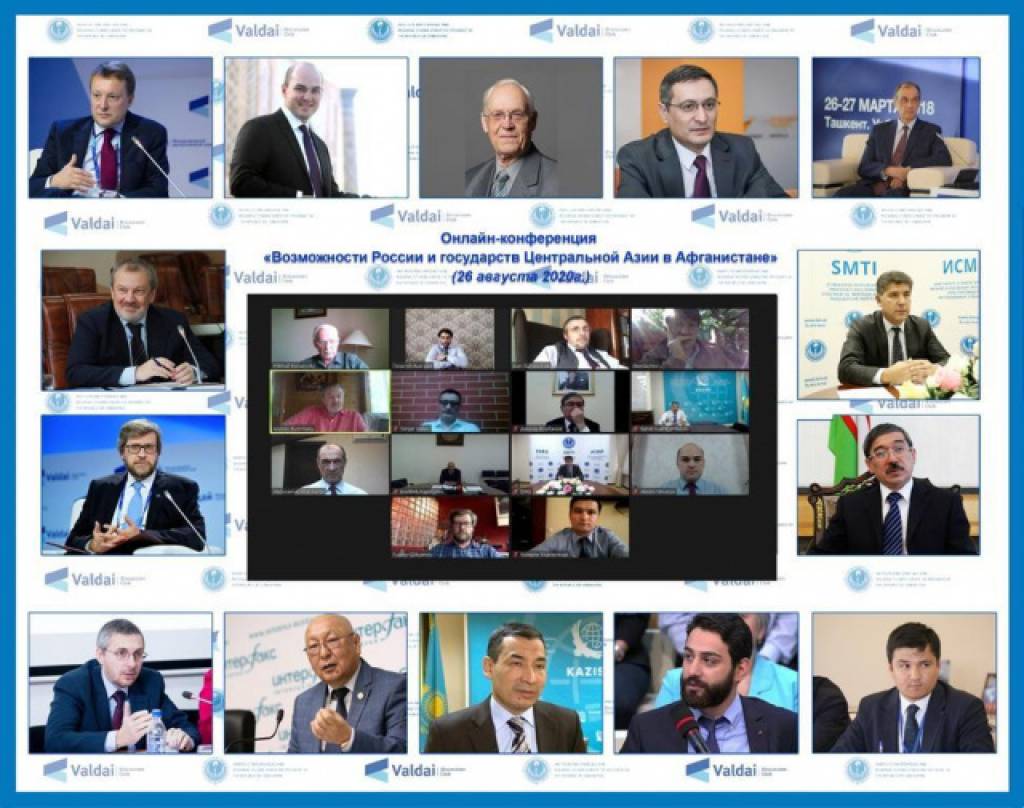ISRS hosts an International conference on Afghanistan

A virtual conference on “Opportunities for Russia and Central Asian States in Afghanistan” has taken place on August 26.
A virtual conference on “Opportunities for Russia and Central Asian States in Afghanistan” has taken place on August 26, organized by the Institute for Strategic and Regional Studies under the President of the Republic of Uzbekistan and Valdai Discussion Club.
The event was attended by leading experts from Russia and Central Asia.
From the Russian side – diplomats, scientists and researchers representing Valdai Discussion Club, Centre for East Asian and SCO Studies, Institute for International Studies of the MGIMO University of Russian MFA, RIAC.
The expert community of Central Asian States was presented by leading analysts of Kazakhstan Council on Foreign Relations, Kazakhstan Institute for Strategic Studies under the President of the Republic of Kazakhstan, National Institute for Strategic Studies of the Kyrgyz Republic, Center for Strategic Studies under the President of the Republic of Tajikistan, Information and Analytical Center for International Relations and the University of World Economy and Diplomacy under Uzbekistan MFA.
Views were exchanged on prospects for development of the situation in Afghanistan, issues of strengthening cooperation between Russia and Central Asian countries in ensuring regional security. The process of peaceful reconstruction of Afghanistan and the country’s integration into the regional trade and economic ties was discussed.
Addressing the conference, First Deputy Director of the Institute for Strategic and Regional Studies under the President of the Republic of Uzbekistan Akramjon Nematov noted that the establishment of peace and stability in Afghanistan and its economic recovery are key factors for ensuring security and sustainable development of vast Eurasian space.
The expert emphasized that there is no alternative to resolving the situation in Afghanistan through the political dialogue and implementation of an inclusive peace process by Afghans themselves and under the leadership of Afghans themselves.
At the same time, International Conference on Afghanistan, held in March 2018 in Tashkent at the initiative of the Presidents of Uzbekistan and Afghanistan – Shavkat Mirziyoyev and Ashraf Ghani became an important political basis for launching the process of political settlement in the country. Tashkent Declaration, adopted following the conference, consolidated a comprehensive consensus at the regional and global levels on the need to start direct inter-Afghan negotiations as soon as possible and became a kind of strategy for further peace-building in Afghanistan.
Akramjon Nematov pointed out the fundamental importance of full support by the international community for continuous and progressive process of intra-Afghan peace negotiations to achieve long-term and sustainable peace in Afghanistan.
The signing of Peace Agreement between the United States and Taliban in Doha in February this year provided a historic chance to end the 40-year war in Afghanistan and once again confirmed the impossibility of resolving the Afghan problem militarily.
In turn, Chairman of the Board of the Valdai Club Foundation, Andrey Bystritsky expressed a conceptual vision of the process in Afghanistan through the prism of interests of Russia and Central Asian states.
In particular, he stressed that if to talk about connectivity in Eurasia, the role of Central Asia’s transformation into a point of growth, a place of intensive development and a region of modern sound, at least relative stability in Afghanistan, is very important.
Commenting on the role of Uzbekistan in the Afghan settlement and reconstruction, Andrey Bystritsky considered it to be the most important and not fully described, in terms of cultural and historical ties with Afghanistan people, geographical location and influence on the process that are taking place there.
According to him, Uzbekistan is a sine qua non for solving the Afghan equation and the country has done a lot in this direction.
Participants emphasized the importance of ensuring a responsible and gradual withdrawal of international coalition forces, U.S. and NATO, to avoid creating power vacuum in the country, to save the capacity of the government of Afghanistan to fulfil its social obligations to the population, meeting the urgent needs of citizens in stability and security.
The need for continuing consolidated international and regional support to Afghanistan in reconstruction of the country’s economy, so that it can firmly embark on the path of peaceful development in the post-conflict period, was noted.
Considering the economic development as a prerequisite for ensuring sustainable and long-term peace in Afghanistan, experts stressed the importance of developing a broad international program for the post-war reconstruction of Afghanistan.
In this regard, the meeting participants supported efforts of the countries of the region to develop trade-economic cooperation with Afghanistan, including through implementation of infrastructure projects, creating favorable conditions for expanding cross-border trade, air, road and rail freight transport.
It was noted that strengthening transport-communication, trade-economic cooperation with Afghanistan can significantly enhance opportunities for development of trans-regional cooperation, create favorable conditions for launching and implementing joint projects in the country in energy, trade, agriculture, education and culture.
The conference participants were unanimous in that joint programs for economic development of Afghanistan will become a powerful driver for strengthening interconnectedness, sustainable development, shared prosperity in Eurasia, and can serve as a factor in forming a consensus among the parties on the need to achieve long-term peace in Afghanistan.